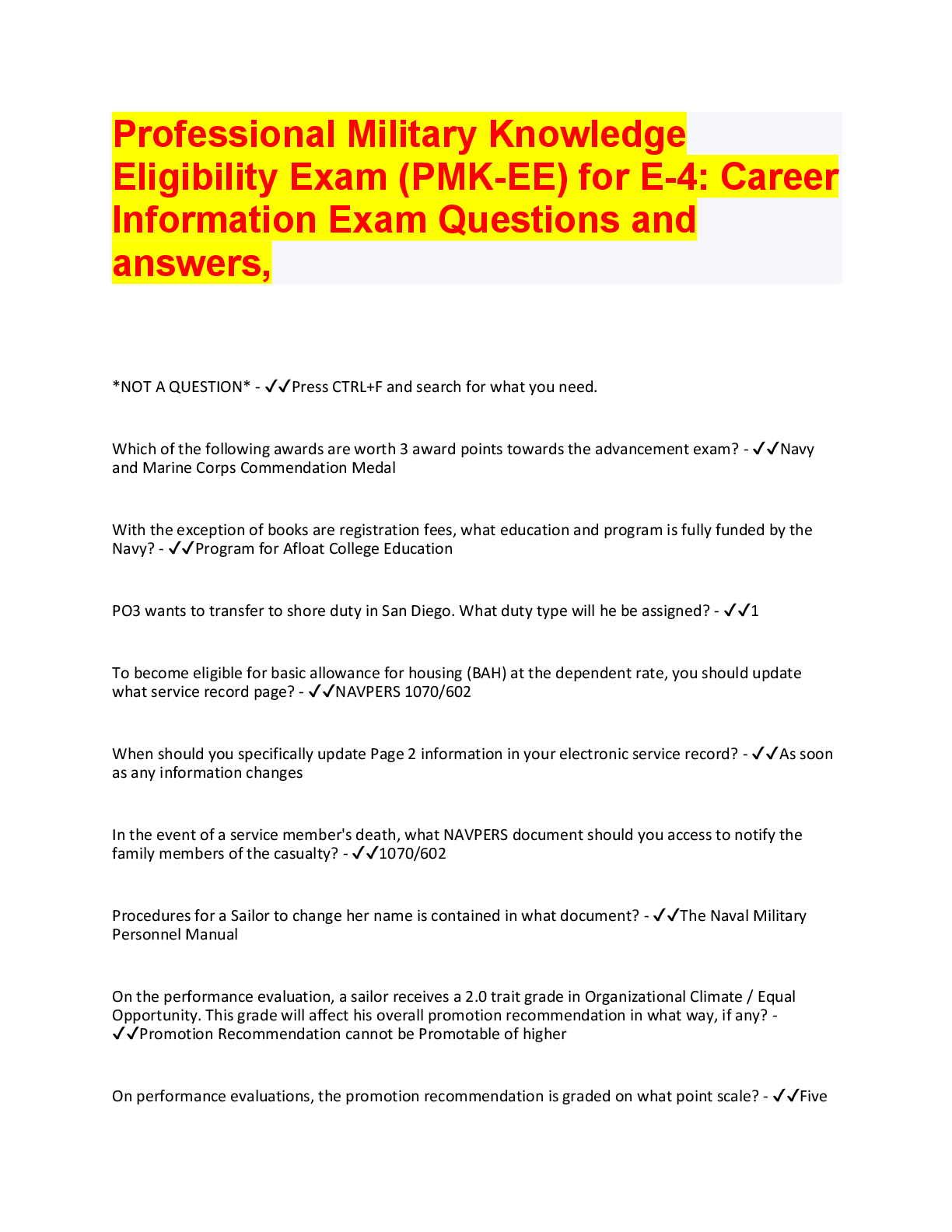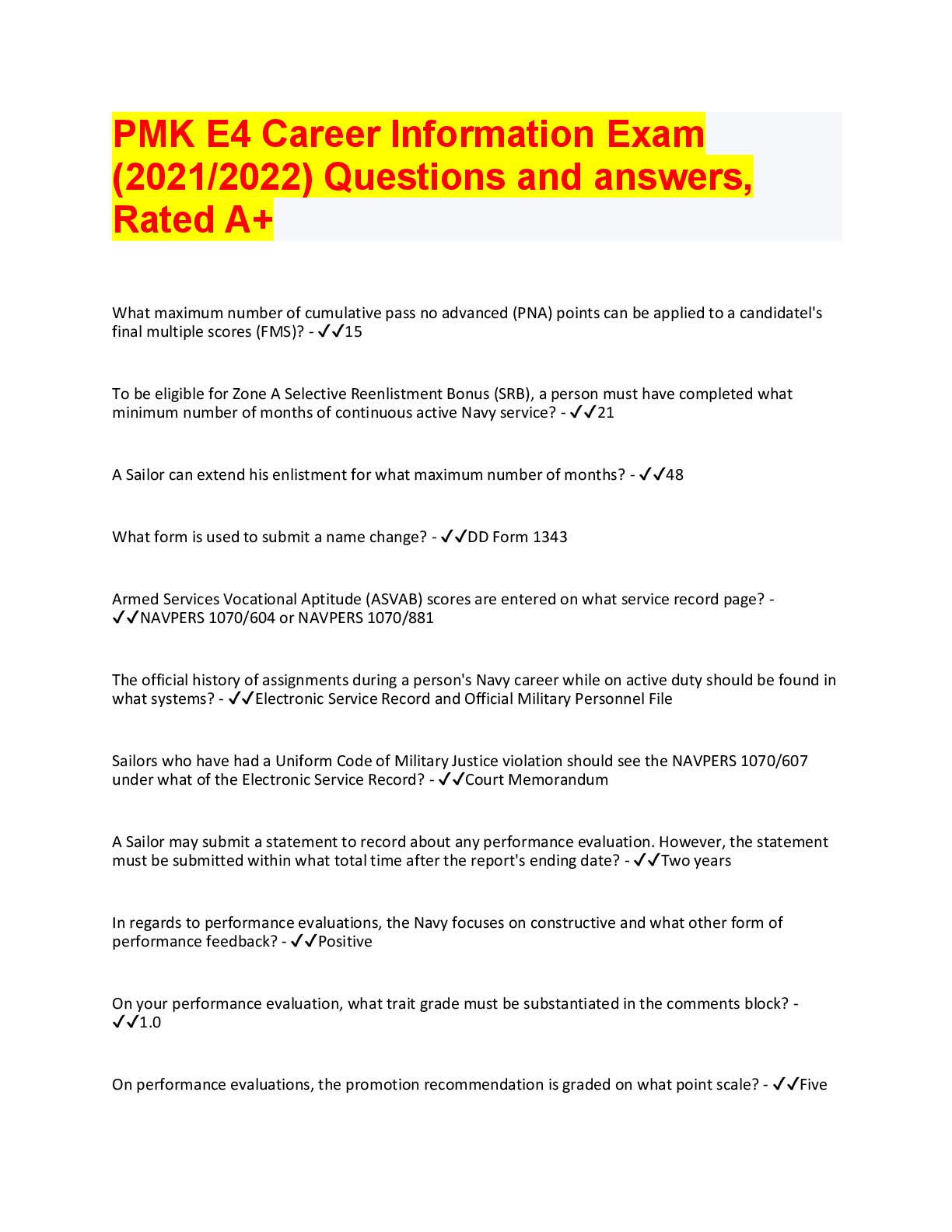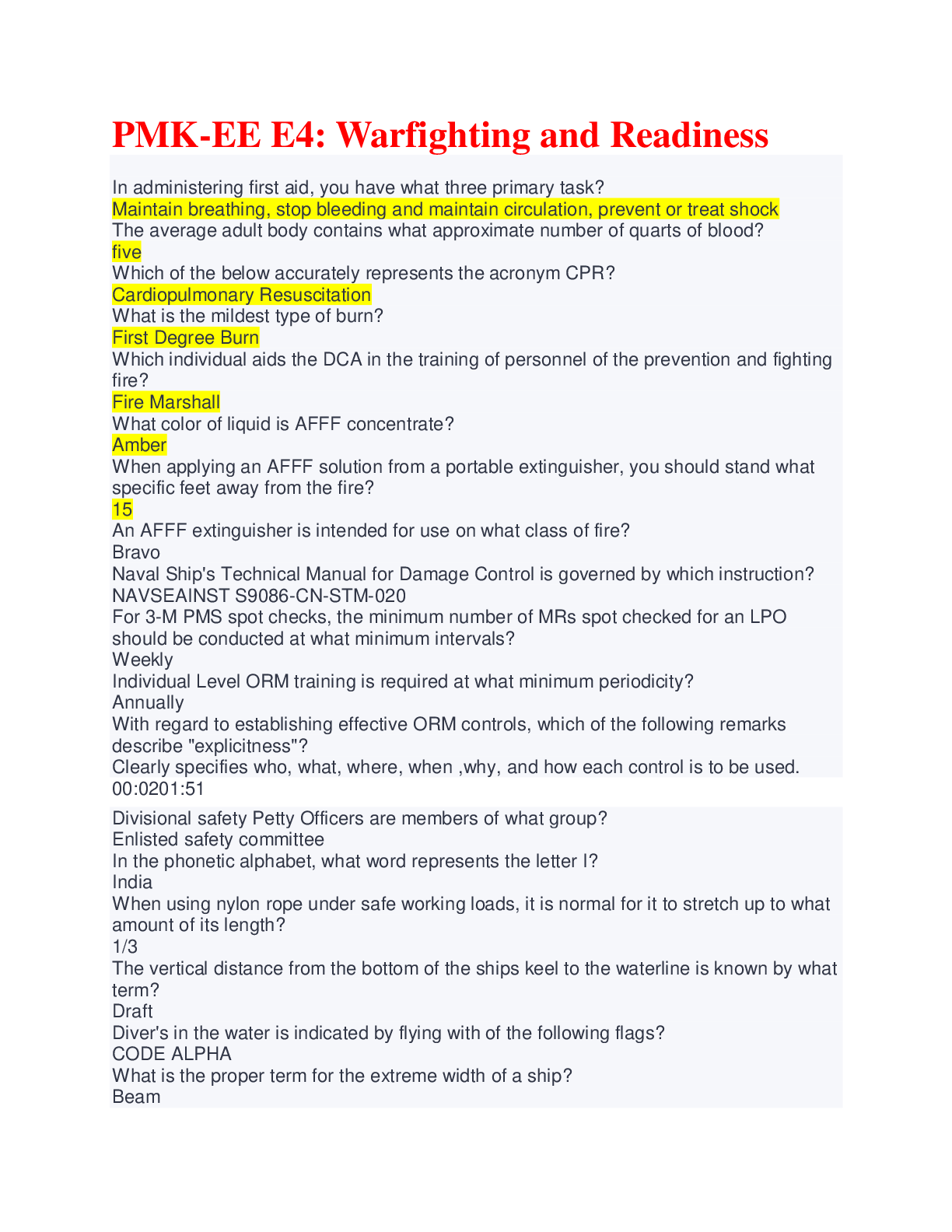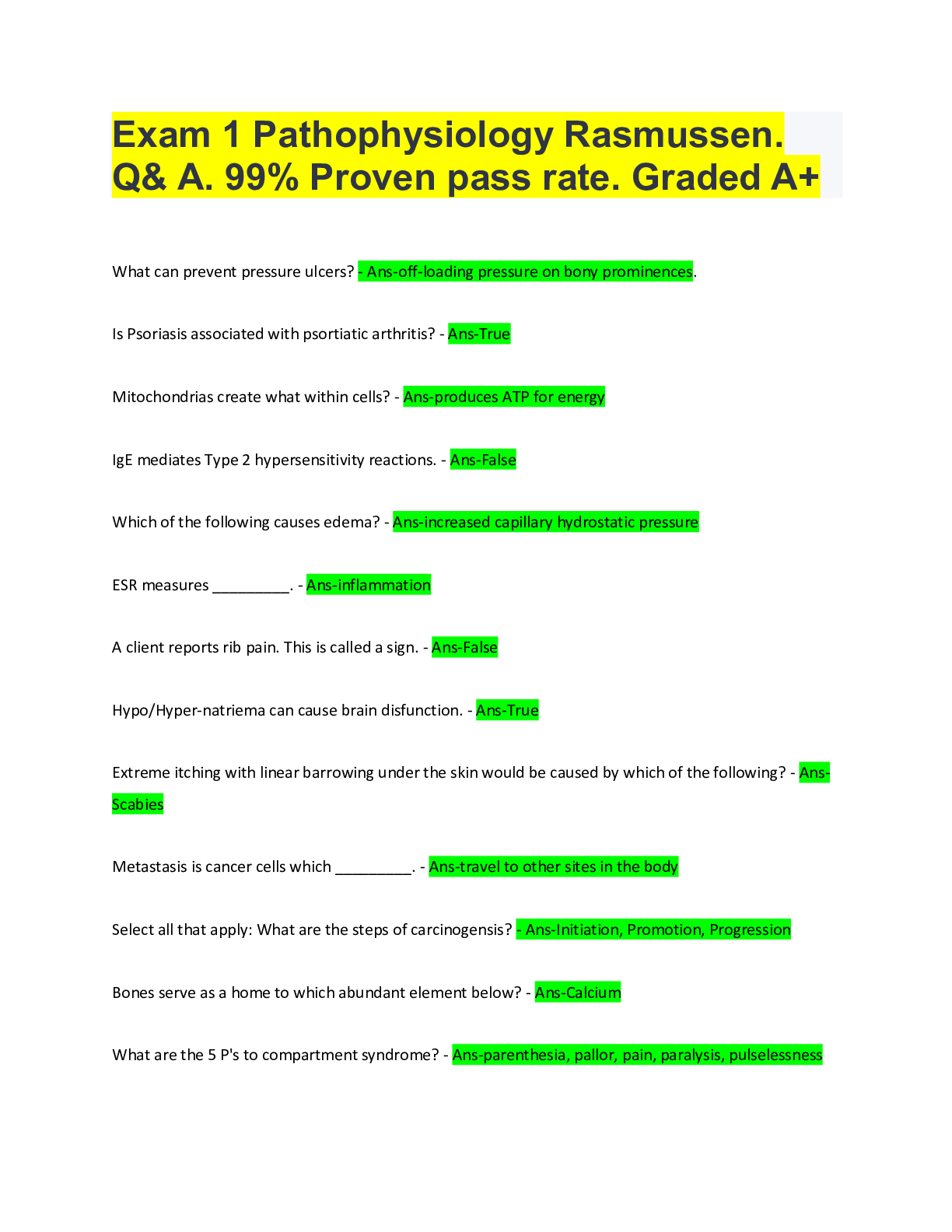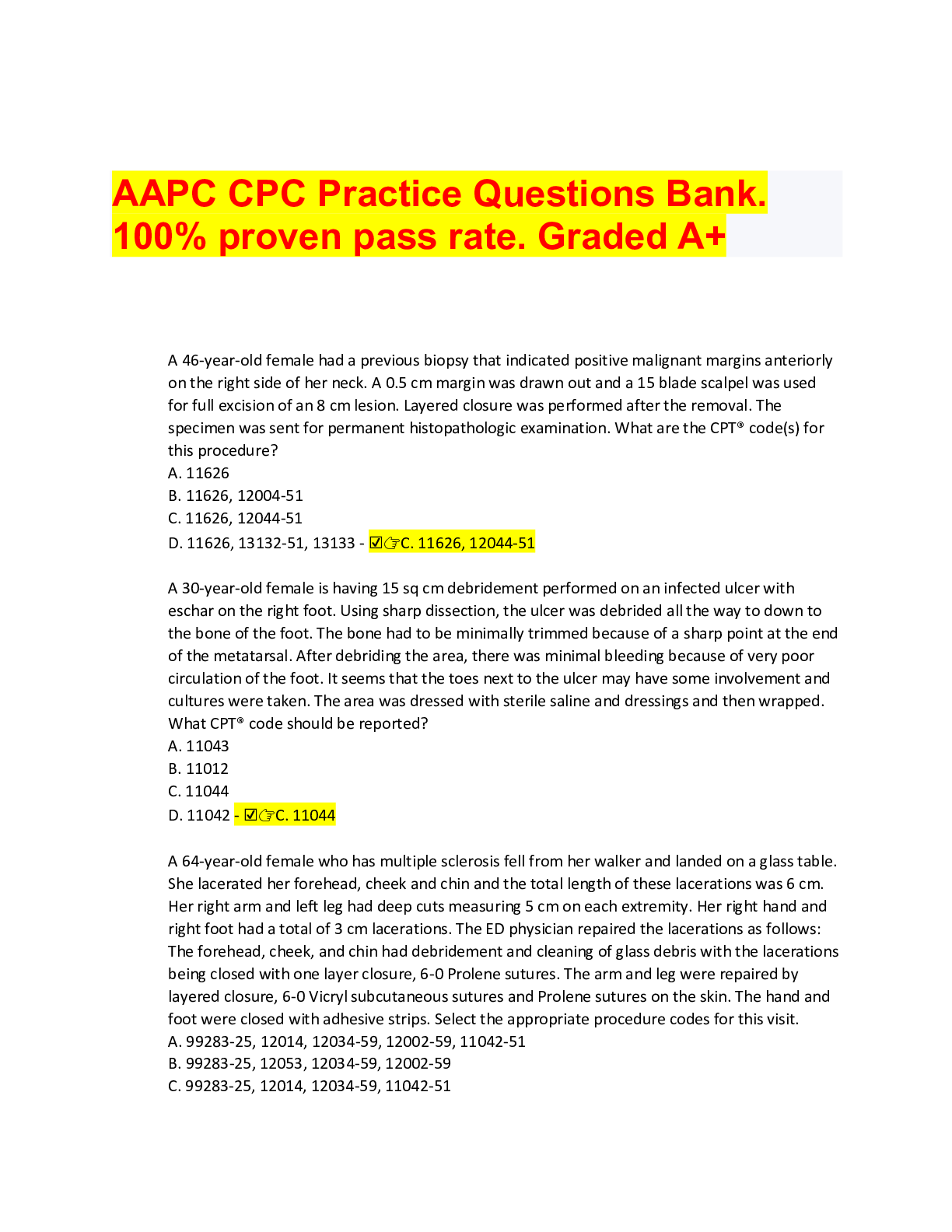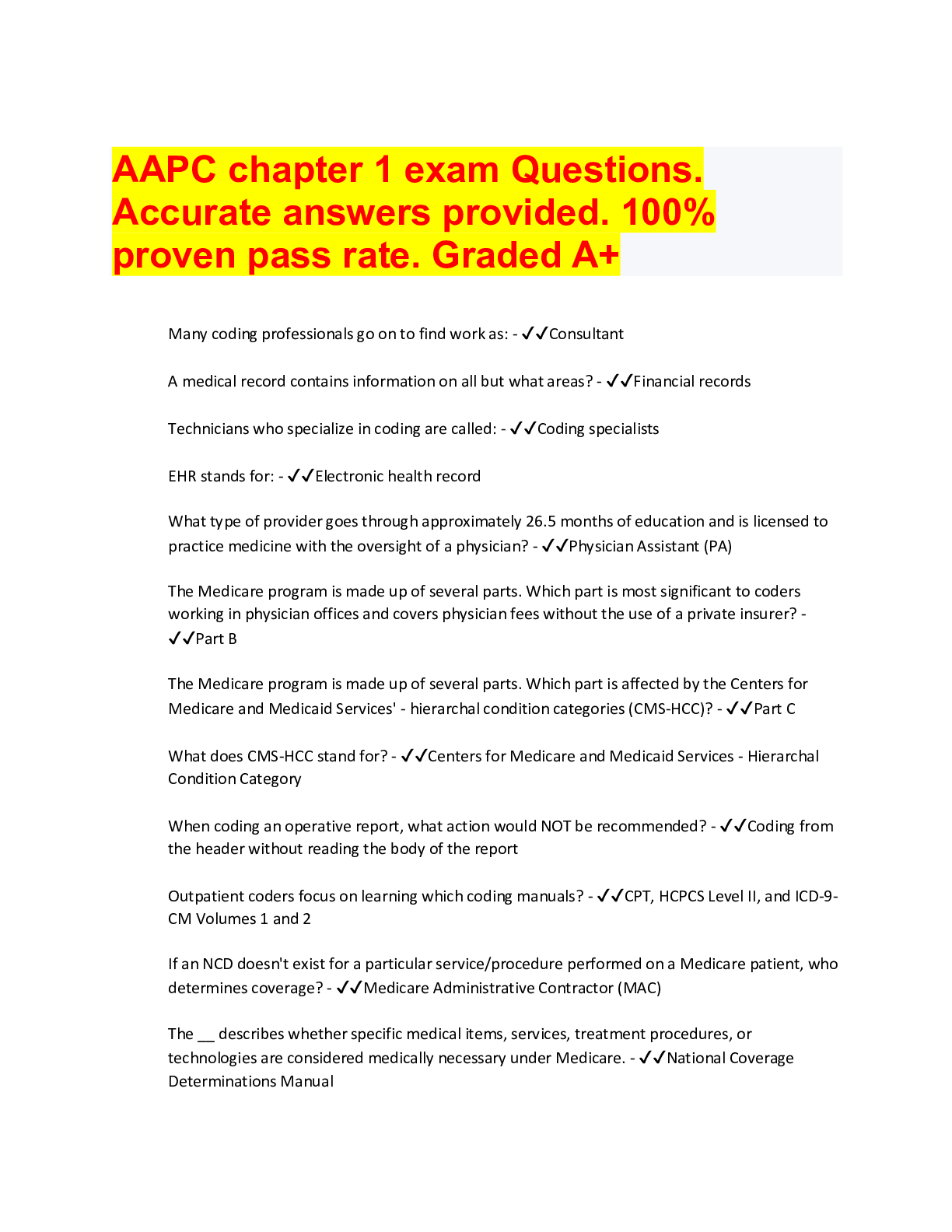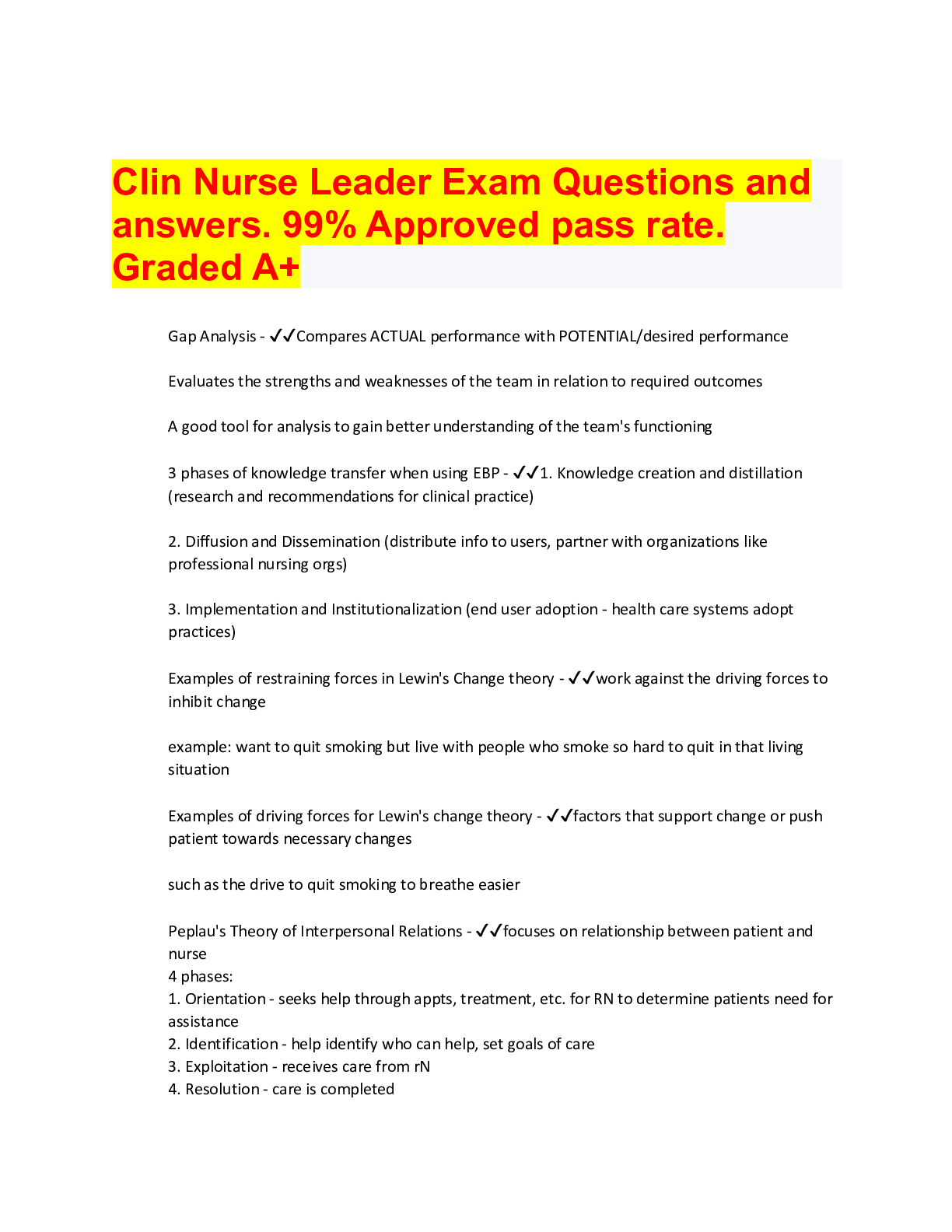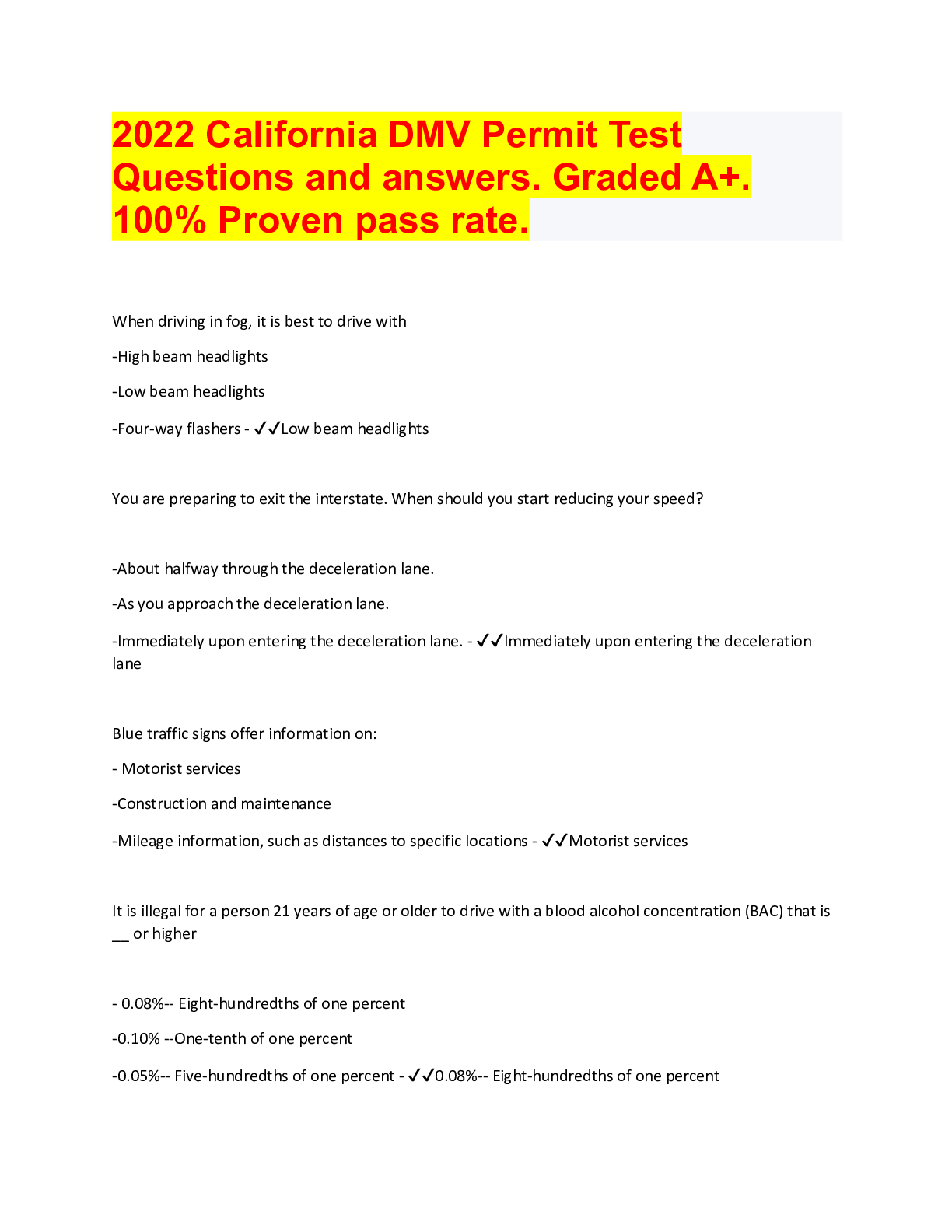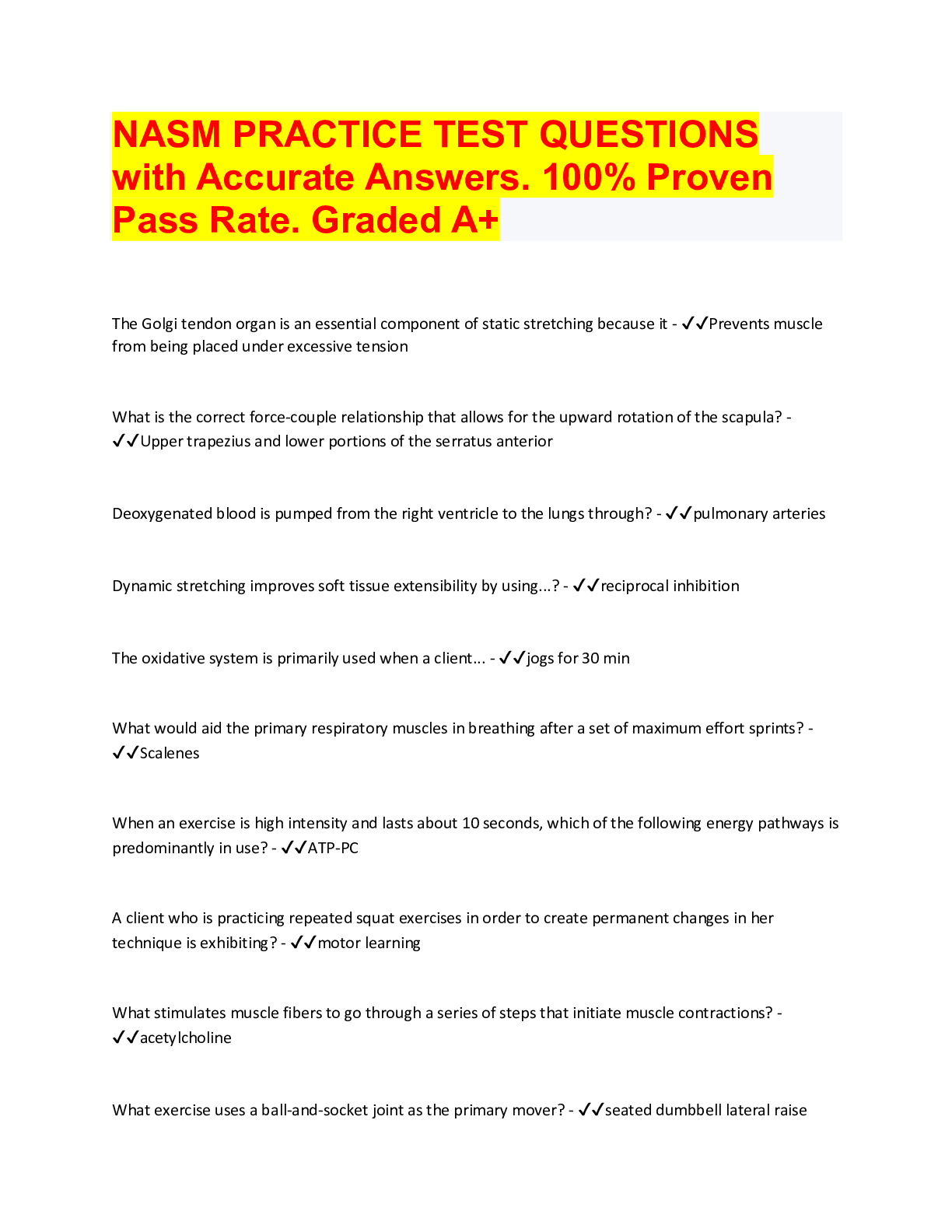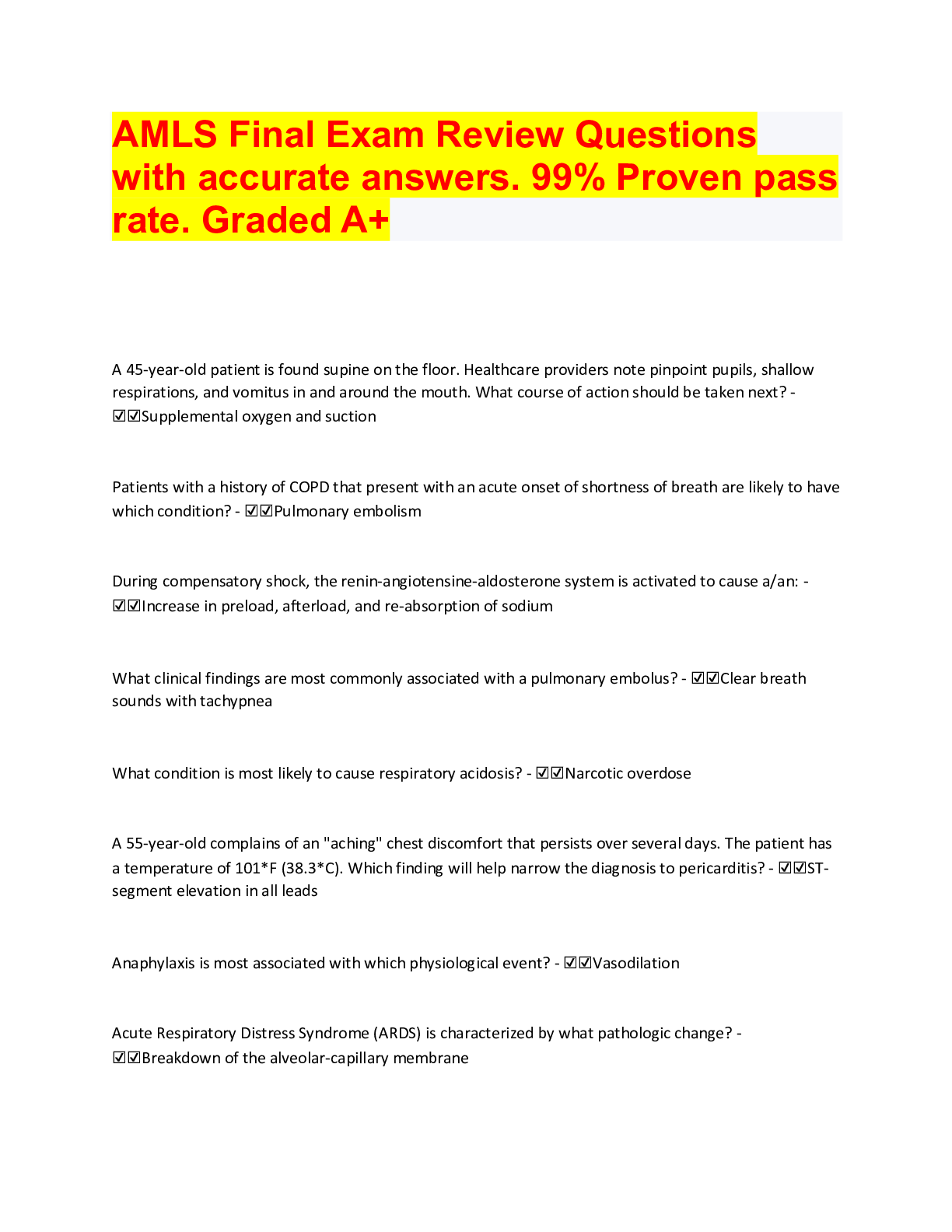*NURSING > QUESTIONS & ANSWERS > NR511. Questions with answers. 2022 version update. 100% pass rate. Graded A+ (All)
NR511. Questions with answers. 2022 version update. 100% pass rate. Graded A+
Document Content and Description Below
NR511. Questions with answers. 2022 version update. 100% pass rate. Graded A+ Mr. Johnson, age 69, has had Meniere disease for several years. He has some hearing loss but now has persistent ver... tigo. What treatment might be instituted to relieve the vertigo? 1.A labyrinthectomy. 2.Pharmacological therapy. 3.A vestibular neurectomy. 4.Wearing an earplug in the ear that has the most hearing loss. - ☑☑3. A vestibular neurectomy. Treatment for achalasia may include: 1. Balloon dilation of the lower esophageal sphincter. 2. Beta blockers. 3. A fundoplication. 4. An esophagogastrectomy. - ☑☑1. Balloon dilation of the LES Which oral medication might be used to treat a client with chronic cholelithiasis who is a poor candidate for surgery? 1.Ursodiol (Actigall). 2.Ibuprofen (Advil). 3.Prednisone (Deltasone). 4.Surgery is the only answer. - ☑☑1. Ursodiol (Actigall) All of the following medications are used for the control of nausea and vomiting. Which medication works by affecting the chemoreceptor trigger zone, thereby stimulating upper gastrointestinal motility and increasing lower esophageal sphincter pressure? 1.Anticholinergics, such as scopolamine (Donnatal). 2.Antidopaminergic agents, such as prochlorperazine (Compazine). 3.Antidopaminergic and cholinergic agents, such as metoclopramide (Reglan). 4.Tetrahydrocannabinols, such as dronabinol (Marinol). - ☑☑3.Antidopaminergic and cholinergic agents, such as metoclopramide (Reglan). You auscultate Julie's abdomen and hear a peritoneal friction rub. Which condition do you rule out? 1.Peritonitis. 2.A liver or spleen abscess. 3.A liver or spleen metastatic tumor. 4.Irritable bowel syndrome. - ☑☑4. IBS Which is the most common presenting symptom of gastric cancer? 1.Weight loss. 2.Dysphagia. 3.Hematemesis. 4.Gastrointestinal bleeding. - ☑☑1. Weight loss The metabolism of which drug is not affected in Marsha, age 74? 1.Alcohol. 2.Anticonvulsants. 3.Psychotropics. 4.Oral anticoagulants. - ☑☑1. Alcohol Nausea is difficult to discern in a young child. What question might you ask to determine if a child has nausea? 1."Are you sick to your tummy?" 2."Are you hungry?" 3."Are you eating the way you normally eat?" 4."Are you nauseous?" - ☑☑2. "Are you hungry?" Zena just had a hemorrhoidectomy. You know she has not understood your teaching when she tells you she will: 1.Take a sitz bath after each bowel movement for 1 to 2 weeks after surgery. 2.Drink at least 2000 mL of fluids per day. 3.Decrease her dietary fiber for 1 month. 4.Take stool softeners as prescribed. - ☑☑3.Decrease her dietary fiber for 1 month. Stacy, a nursing student, is to begin her series of hepatitis B vaccinations. You test her for a serological marker, and the results show hepatitis B surface antibodies (HBsAb). You tell Stacy that she: 1.Needs to begin the hepatitis B series as soon as possible. 2.Needs to be tested again because one reading is not indicative of immunity. 3.Is permanently immune to hepatitis B. 4.Has an acute hepatitis B infection. - ☑☑3. Is permanently immune to hepatitis B. Margie, age 52, has an extremely stressful job and was just given a diagnosis of gastric ulcer. She tells you she is sure it is going to be malignant. How do you respond? 1."Don't worry. Gastric ulcers are not cancerous." 2."About 95% of gastric ulcers are benign." 3."You have about a 50% chance of having gastric cancer from your ulcer." 4."Even if it is cancer, surgery is 100% successful." - ☑☑2."About 95% of gastric ulcers are benign." You are counseling Lillian, who is lactose intolerant, about foods to avoid. You know she misunderstands the teaching when she tells you she can have: 1.Yogurt. 2.Foods containing whey. 3.Prehydrolyzed milk. 4.Oranges. - ☑☑2.Foods containing whey. Susan, age 59, has no specific complaints when she comes in for her annual examination. She does, however, have type 2 diabetes mellitus (DM), slight hypertension, dyslipidemia, and central obesity. How would you diagnose her? 1.As a healthy adult with several problems. 2.As having a glycemic event. 3.As having metabolic syndrome. 4.As having multiple organ dysfunction - ☑☑3. As having metabolic syndrome. Tom has just been diagnosed with celiac disease. Which of the following might you tell him? 1.There is a new pharmaceutical cure for celiac disease. 2.A strict gluten-free diet is the only treatment for celiac disease. 3.Your children will not be at a higher risk for developing this disease. 4.The presence of celiac disease is decreasing dramatically in the United States. - ☑☑2.A strict gluten-free diet is the only treatment for celiac disease. Simon, age 72, states that he is worried because he has a bowel movement only every third day. You respond:1. "You should have two to three stools per day." 2."You should defecate once a day." 3."You should have at least three stools per week." 4."There is no such thing as a 'normal' pattern of defecation." - ☑☑4. "There is no such thing as a 'normal' pattern of defecation." Matt, age 26, recently returned from a camping trip and has gastroenteritis. He says that he has been eating only canned food. Which of the following pathogens do you suspect? 1.Campylobacter jejuni. 2.Clostridium botulinum. 3.Clostridium perfringens. 4.Staphylococcus. - ☑☑2. Clostridium botulinum. Timothy, age 68, complains of an abrupt change in his defecation pattern. You evaluate him for: 1.Constipation. 2.Colorectal cancer. 3.Irritable bowel syndrome. 4.Acute appendicitis. - ☑☑2. Colorectal cancer. Ruby has a colostomy and complains that her stools are too loose. What food(s) do you suggest to help thicken the stools? 1.Cheese. 2.Leafy green vegetables. 3.Raw fruits and vegetables. 4.Dried beans. - ☑☑1. Cheese Martina, age 34, has AIDS and currently suffers from diarrhea. You suspect she has which protozoal infection of the bowel? 1.Giardiasis. 2.Amebiasis. 3.Cryptosporidiosis. 4.Escherichia coli. - ☑☑3. Cryptosporidiosis. Anson tells you he thinks his antacids are causing his diarrhea. You respond: 1."Antacids contain fructose, which may not be totally absorbed, resulting in fluid being drawn into the bowel." 2."Antacids contain sorbitol or mannitol, which are sugars that aren't absorbed and can cause fluid to be drawn into the bowel." 3."Antacids contain caffeine, which decreases bowel transit time." 4."Antacids may contain magnesium, which decreases bowel transit time and may contain poorly absorbed salts that draw fluid into the bowel." - ☑☑4."Antacids may contain magnesium, which decreases bowel transit time and may contain poorly absorbed salts that draw fluid into the bowel." Tina has a chronic hepatitis C infection. She asks you how to prevent its transmission. You respond: 1."Do not donate blood until one year after diagnosis." 2."Abstain from sex altogether." 3."There is no possibility of transmission through razors or toothbrushes." 4."Abstain from sex during your period." - ☑☑4. "Abstain from sex during your period." Marcie just returned from Central America with traveler's diarrhea. Which is the best treatment? 1.Metronidazole (Flagyl). 2.Supportive care. 3.Quinolone antibiotics. 4.Gastric lavage. - ☑☑2. Supportive care. Your client's 2-month-old daughter is admitted with gastroenteritis and dehydration after 2 days of vomiting and diarrhea. When the father asks you what is causing the child's diarrhea, how do you respond? 1."She must be lactose intolerant from the formula, and this is altering the fluid balance." 2."Her body's telling you that it's time to introduce some solids into her system." 3."The virus is causing irritation of the gastrointestinal lining, which causes diarrhea." 4."The infectious agent invaded the stomach lining and is affecting the balance of water and nutrients." - ☑☑4. "The infectious agent invaded the stomach lining and is affecting the balance of water and nutrients." Sandy, age 52, presents with jaundice, dark urine, and light-colored stools, stating that she is slightly improved over last week's symptoms. Which stage of viral hepatitis do you suspect? 1.Incubation. 2.Prodromal. 3.Icteric. 4.Convalescent. - ☑☑3. Icteric. When Sammy asks you what he can do to help his wife, who has dumping syndrome, what do you suggest he encourage her to do? 1.Eat foods higher in carbohydrates. 2.Eat 3 large meals plus 3 snacks per day. 3.Eat foods with a moderate fat and protein content. 4.Drink fluids with each meal. - ☑☑3.Eat foods with a moderate fat and protein content. Cydney has been given a diagnosis of ascariasis. Which symptoms would you expect to see? 1.Low-grade fever, productive cough with blood-tinged sputum, wheezing, and dyspnea. 2.Nocturnal perianal and perineal pruritus. 3.Diarrhea, cramps, and malaise. 4.Ascites and facial and extremity edema. - ☑☑1.Low-grade fever, productive cough with blood-tinged sputum, wheezing, and dyspnea. Rose, a client with gastroesophageal reflux disease (GERD), has many other concurrent conditions. In teaching Rose about medications to avoid, what do you recommend she refrain from using? 1.Antibiotics. 2.Nonsteroidal anti-inflammatory drugs (NSAIDs). 3.Oral contraceptives. 4.Antifungals. - ☑☑2. Nonsteroidal anti-inflammatory drugs (NSAIDs). Ellie, age 42, has a seizure disorder and has been taking phenytoin (Dilantin) for years. Which supplement should she also be taking if no other problems exist? 1.Vitamin B12. 2.Iron. 3.Folic acid. 4.Calcium. - ☑☑3. Folic acid. Samantha, age 28, is 100 lb overweight and wants to have a gastroplasty performed. In discussing this with her, you explain that by having this procedure she may: 1.Develop diarrhea. 2.Lose too much weight. 3.Develop hemorrhoids. 4.Vomit after she eats. - ☑☑1. Develop diarrhea. Lucy, age 49, has pain in both the left and right lower quadrants. What might you suspect? 1.A gastric ulcer. 2.Gastritis. 3.Pelvic inflammatory disease. 4.Pancreatitis. - ☑☑3. Pelvic inflammatory disease. Rose has gastroesophageal reflux disease (GERD). You know she misunderstands your teaching when she tells you she will: 1.Avoid coffee, alcohol, chocolate, peppermint, and spicy foods. 2.Eat smaller meals. 3.Have a snack before retiring so that the esophagus and stomach are not empty at bedtime. 4.Stop smoking. - ☑☑3. Have a snack before retiring so that the esophagus and stomach are not empty at bedtime. You suspect appendicitis in Andrew, who is 18. With his right hip and knee flexed, you slowly rotate his right leg internally to stretch a muscle. He states that it is painful over his right lower quadrant. Which sign did you elicit? 1.Rovsing sign. 2.Psoas sign. 3.Obturator sign. 4.McBurney sign. - ☑☑3. Obturator sign. Marty, age 52, notices a bulge in his midline every time he rises from bed in the morning. You tell him that it is a ventral hernia, also known as an: 1.Inguinal hernia. 2.Epigastric hernia. 3.Umbilical hernia. 4.Incisional hernia. - ☑☑2. Epigastric hernia. You elicit costovertebral angle tenderness in Gordon, age 29. Which condition do you suspect? 1.Cirrhosis. 2.Inflammation of the kidney. 3.Inflammation of the spleen. 4.Peritonitis. - ☑☑2. Inflammation of the kidney. Marvin, a known alcoholic with cirrhosis, is frequently admitted for coagulopathies and occasionally receives blood transfusions. His wife asks you why he has bleeding problems. How do you respond? 1."Occasionally he accumulates blood in the gut." 2."There is an interruption of the normal clotting mechanism." 3."Long-term alcohol abuse has made his vessels very friable." 4."His bone marrow has been affected." - ☑☑2. "There is an interruption of the normal clotting mechanism." In a 2-month-old infant with vomiting and diarrhea, the most effective way of determining a fluid deficit is to check for: 1.Decreased peripheral perfusion. 2.Hyperventilation. 3.Irritability. 4.Hyperthermia. - ☑☑1. Decreased peripheral perfusion. Olive has an acute exacerbation of Crohn's disease. Which laboratory test value(s) would you expect to be decreased? 1.Sedimentation rate. 2.Liver enzyme levels. 3.Vitamin A, B complex, and C levels. 4.Bilirubin level. - ☑☑3. Vitamin A, B complex, and C levels. You suspect that Harry has a peptic ulcer and tell him that it has been found to be strongly associated with: 1.Anxiety and panic attacks. 2.Long-term use of nonsteroidal anti-inflammatory drugs (NSAIDs). 3.Infection by Helicobacter pylori. 4.A family history of peptic ulcers. - ☑☑3. Infection by Helicobacter pylori. You are trying to differentiate between functional (acquired) constipation and Hirschsprung disease in a neonate. Distinguishing features of Hirschsprung disease include which of the following? 1. Small ribbonlike stools. 2. Obvious abdominal pain. 3. Female gender. 4. Small weight gain. - ☑☑1. Small ribbonlike stools. You are doing routine teaching with a patient who has a family history of colorectal cancer. You know she misunderstands the teaching when she tells you she will: 1.Decrease her fat intake. 2.Increase her fiber intake. 3.Continue her daily use of aspirin. 4.Increase her fluid intake. - ☑☑4. Increase her fluid intake. Dottie brings in her infant, who has gastroesophageal reflux. What do you tell her about positioning her infant? 1."Always position infants on their back to prevent sudden infant death syndrome." 2."Rotate your infant between lying on the back and on the stomach." 3."Your infant should be placed on the left side." 4."Place your infant in whatever position she remains quiet." - ☑☑1. "Always position infants on their back to prevent sudden infant death syndrome." Shelby has recently been diagnosed with pancreatitis. Of the following objective findings that can result from the pancreatic inflammatory process, which is known as Grey Turner sign? 1.Left-sided pleural effusion. 2.Bluish discoloration over the flanks. 3.Bluish discoloration around the umbilicus. 4.Jaundice. - ☑☑2. Bluish discoloration over the flanks. Bobby, age 6, has constant periumbilical pain shifting to the right lower quadrant, vomiting, a small volume of diarrhea, absence of headache, a mild elevation of the white blood cell count with an early left shift, and white blood cells in the urine. You suspect: 1.Appendicitis. 2.Gastroenteritis. 3.Acute pancreatitis. 4.Rocky Mountain spotted fever. - ☑☑1. Appendicitis. Melva, age 63, presents with an acute exacerbation of pancreatitis, and you are going to admit her to the hospital. Which is the most important factor in determining a negative long-term outcome for her? 1.Age. 2.Infection. 3.Pain. 4.Length of time between exacerbations. - ☑☑2. Infection. A mother brings in her 4-year-old child, who she states has acute abdominal pain and a rash. Which of the following do you initially rule out? 1.Rocky Mountain spotted fever. 2.Measles. 3.Appendicitis. 4.A food allergy. - ☑☑3. Appendicitis. Harvey just came back from Mexico. Which pathogen do you suspect is responsible for his diarrhea? 1.Enterococci. 2.Escherichia coli. 3.Klebsiella. 4.Staphylococci. - ☑☑2. Escherichia coli. To differentiate among the different diagnoses of inflammatory bowel diseases, you look at the client's histological, culture, and radiological features. Mary has transmural inflammation, granulomas, focal involvement of the colon with some skipped areas, and sparing of the rectal mucosa. What do you suspect? 1.Crohn disease. 2.Ulcerative colitis. 3.Infectious colitis. 4.Ischemic colitis. - ☑☑1. Crohn disease. Marian, age 52, is obese. She complains of a rapid onset of severe right upper quadrant abdominal cramping pain, nausea, and vomiting. Your differential diagnosis might be: 1.Appendicitis. 2.Crohn's disease. 3.Cholecystitis. 4.Irritable bowel syndrome. - ☑☑3. Cholecystitis. You suspect that Nikki has a gastroduodenal ulcer caused by Helicobacter pylori and plan to treat her empirically. What medications should you order? 1.A proton pump inhibitor (omeprazole), tetracycline or amoxicillin, and metronidazole (Flagyl). 2.Bismuth subsalicylate (Pepto-Bismol) and omeprazole (Prilosec). 3.Amoxicillin (Amoxil) and omeprazole (Prilosec). 4.Clarithromycin (Biaxin) and metronidazole (Flagyl). - ☑☑1. A proton pump inhibitor (omeprazole), tetracycline or amoxicillin, and metronidazole (Flagyl). Which of the following medications/drugs are not known to cause heartburn or dyspepsia? 1.Alcohol. 2.Motrin. 3.Prednisone. 4.Tylenol. - ☑☑4. Tylenol. Icterus due to hyperbilirubinemia is seen when the serum level of bilirubin is greater than? 1.2.5 mg/dL. 2.1.0 mg/dL. 3.2.0 mg/dL. 4.0.5 mg/dL. - ☑☑1. 2.5 mg/dL.c A 45-year-old homeless man presents to your urgent care clinic for evaluation. His chief complaint is diarrhea. The patient states he started to have diarrhea 2-3 days ago, and it is getting progressively worse. He also notes nausea without vomiting, dry mouth, and double vision. On exam you notice his pupillary reflex is absent. The patient states he lives on the street and eats mostly canned goods that he scavenges from a grocery store dumpster. What is the likely cause of the patient's symptoms? 1.Botulism. 2.Salmonella. 3Lyme disease. 4.Vitamin C deficiency. - ☑☑1. Botulism. What is the most common bacterial cause of traveler's diarrhea? 1.Escherichia coli. 2.Campylobacter jejuni. 3.Salmonella. 4.Shigella. - ☑☑1. Escherichia coli. A 7-year-old male presents with his mother to the urgent care clinic complaining of abdominal pain. He started to complain of pain prior to going to bed; however, it has gotten progressively worse and is now preventing him from sleeping. He is nauseous but hasn't vomited and didn't eat dinner due to the pain. The patient appears pale and is complaining of right-sided abdominal pain. His vitals are as follows: blood pressure 130/85, pulse 120, temperature 100.5°F, pulse oximetry 98% on room air. On physical exam he is tender in the right lower quadrant. His complete blood count (CBC) shows a white blood cell count (WBC) of 17.0. What is the patient's likely diagnosis? [Show More]
Last updated: 3 years ago
Preview 1 out of 47 pages

Buy this document to get the full access instantly
Instant Download Access after purchase
Buy NowInstant download
We Accept:

Reviews( 0 )
$12.00
Can't find what you want? Try our AI powered Search
Document information
Connected school, study & course
About the document
Uploaded On
Aug 16, 2022
Number of pages
47
Written in
Seller

Reviews Received
Additional information
This document has been written for:
Uploaded
Aug 16, 2022
Downloads
0
Views
101




